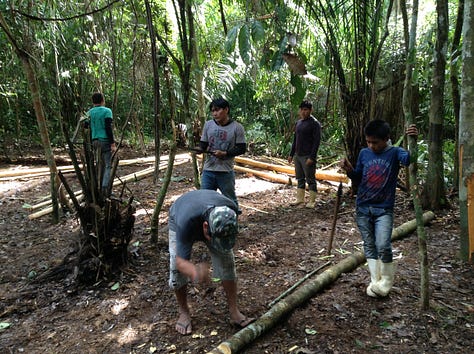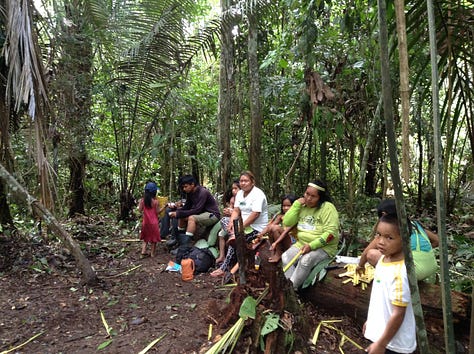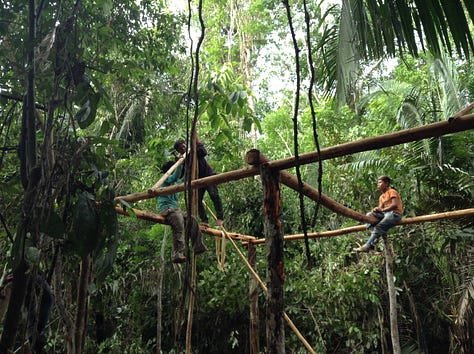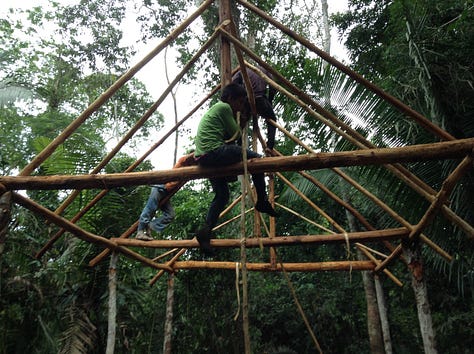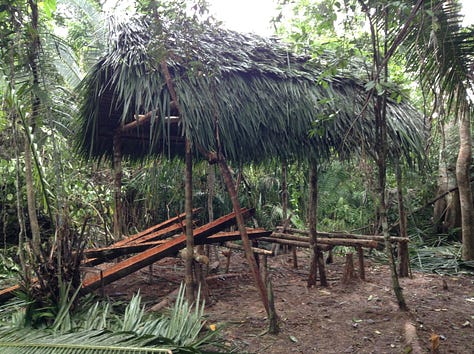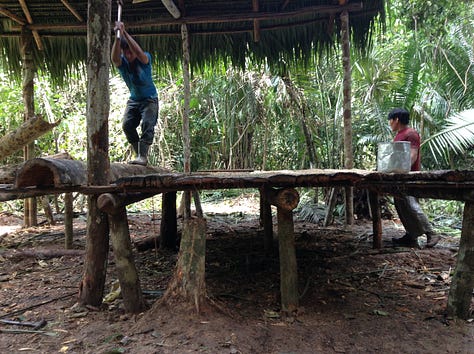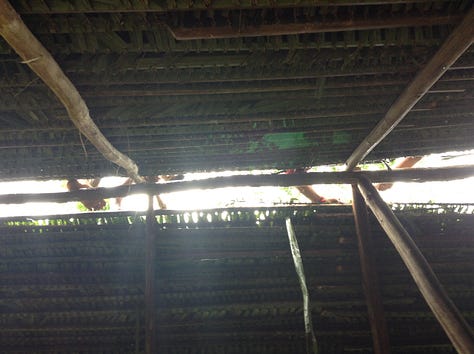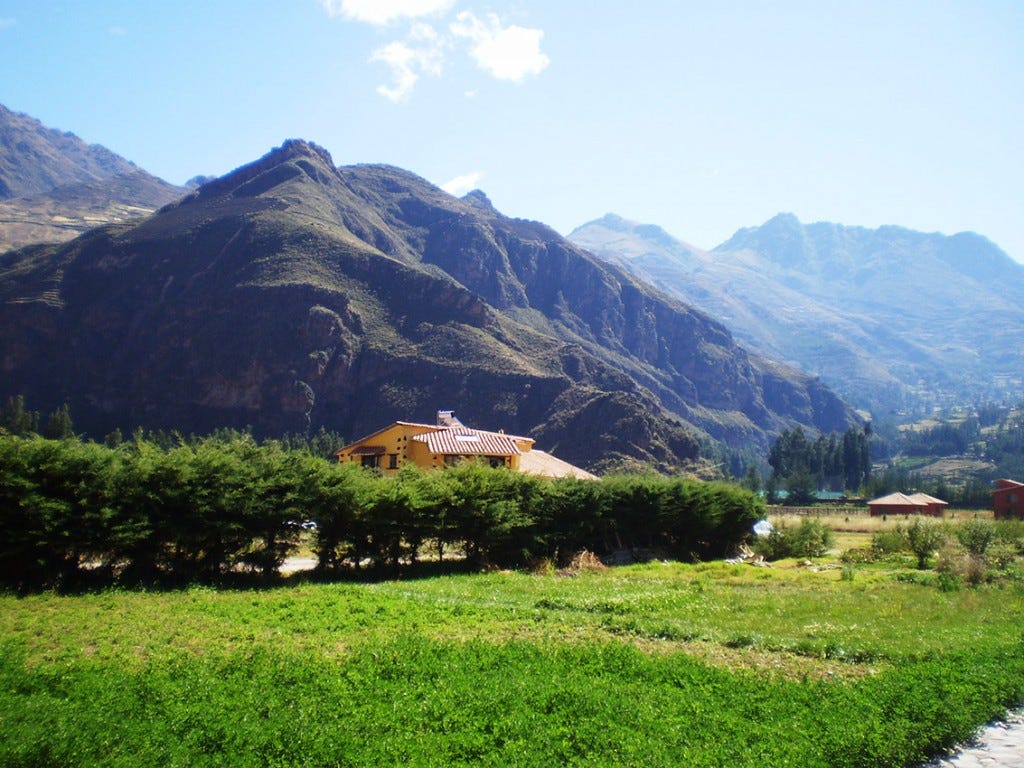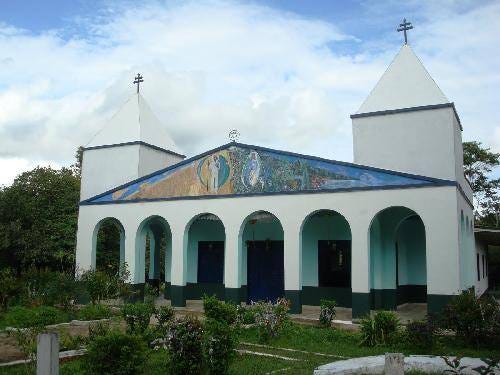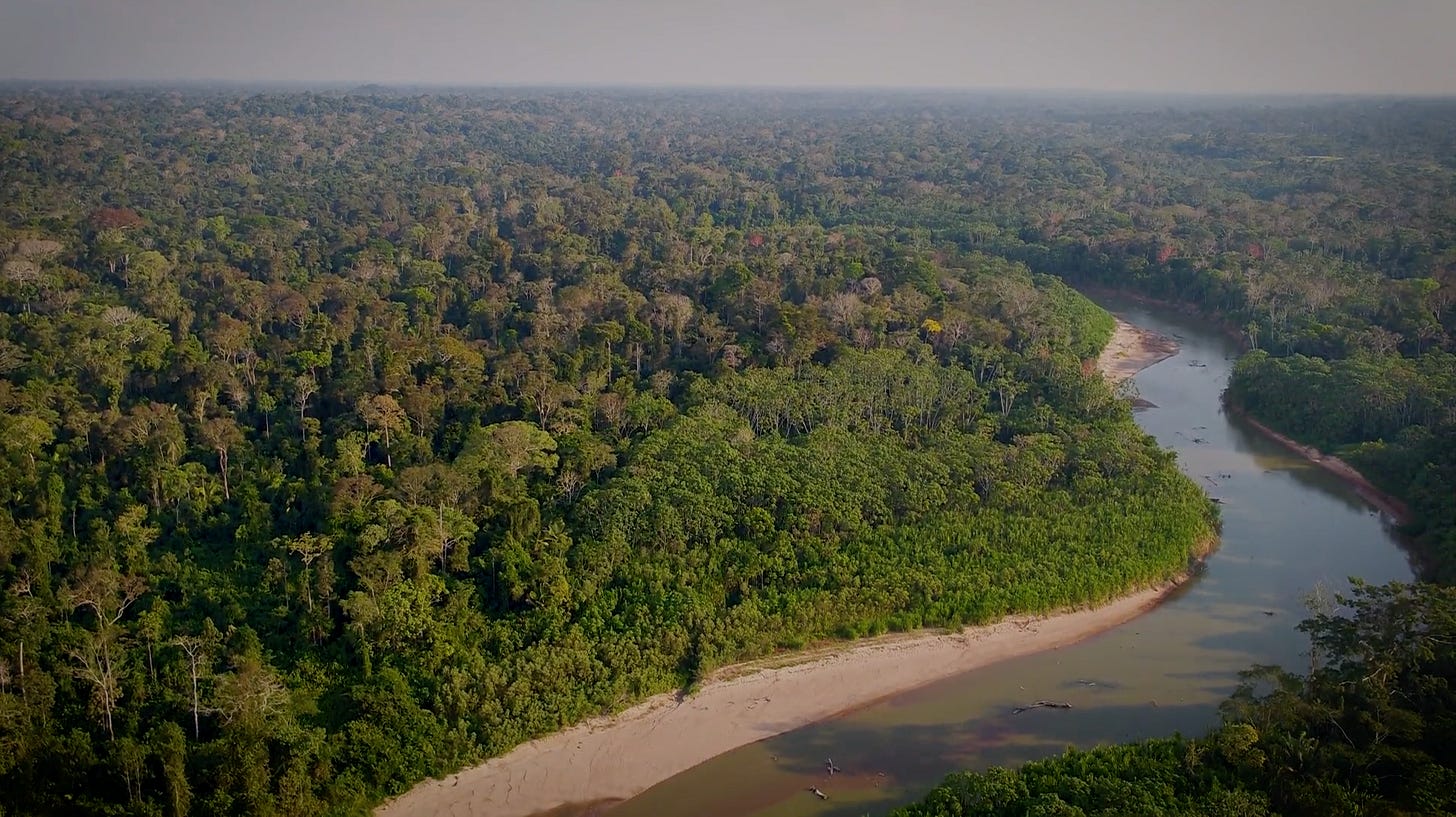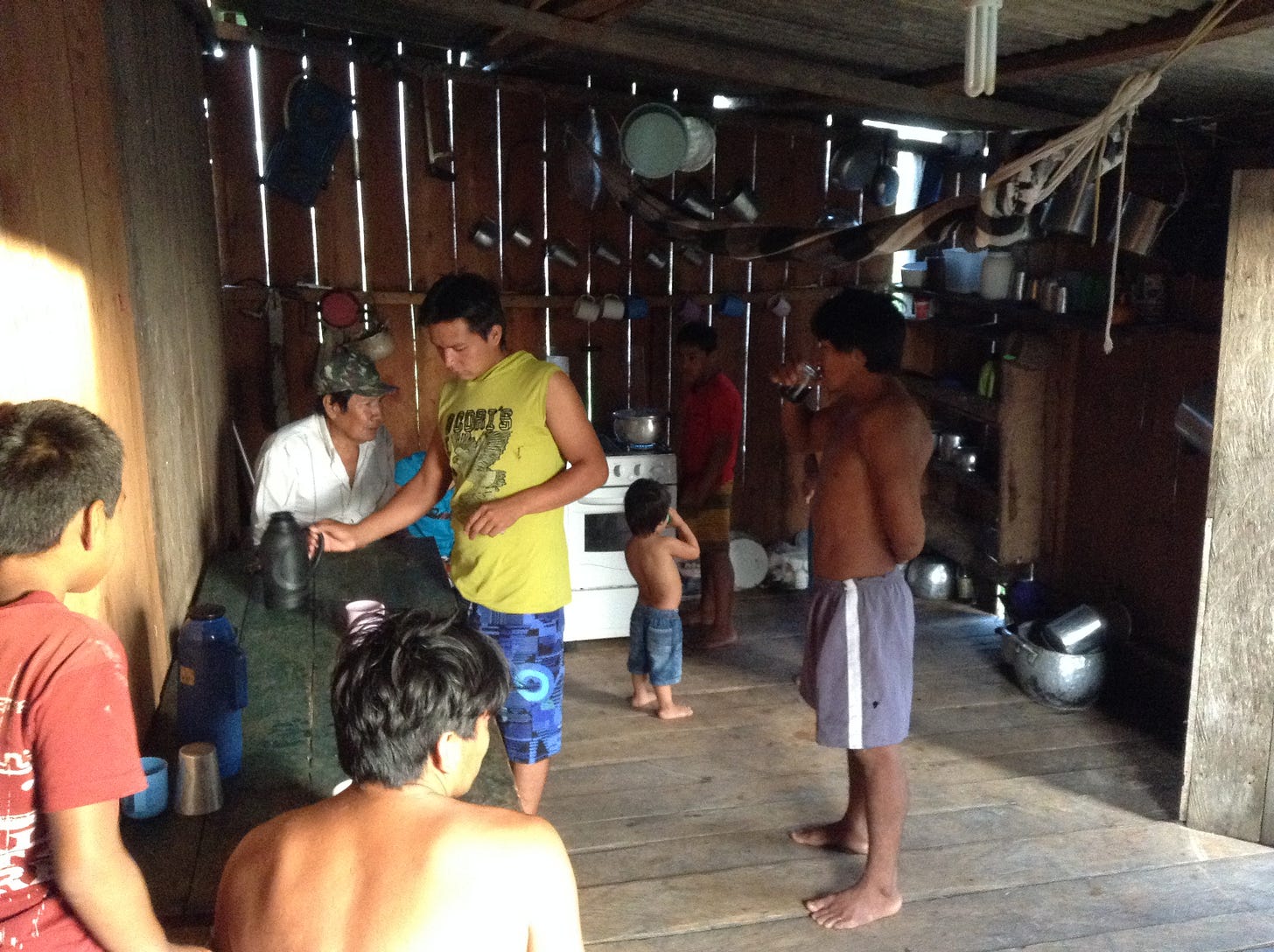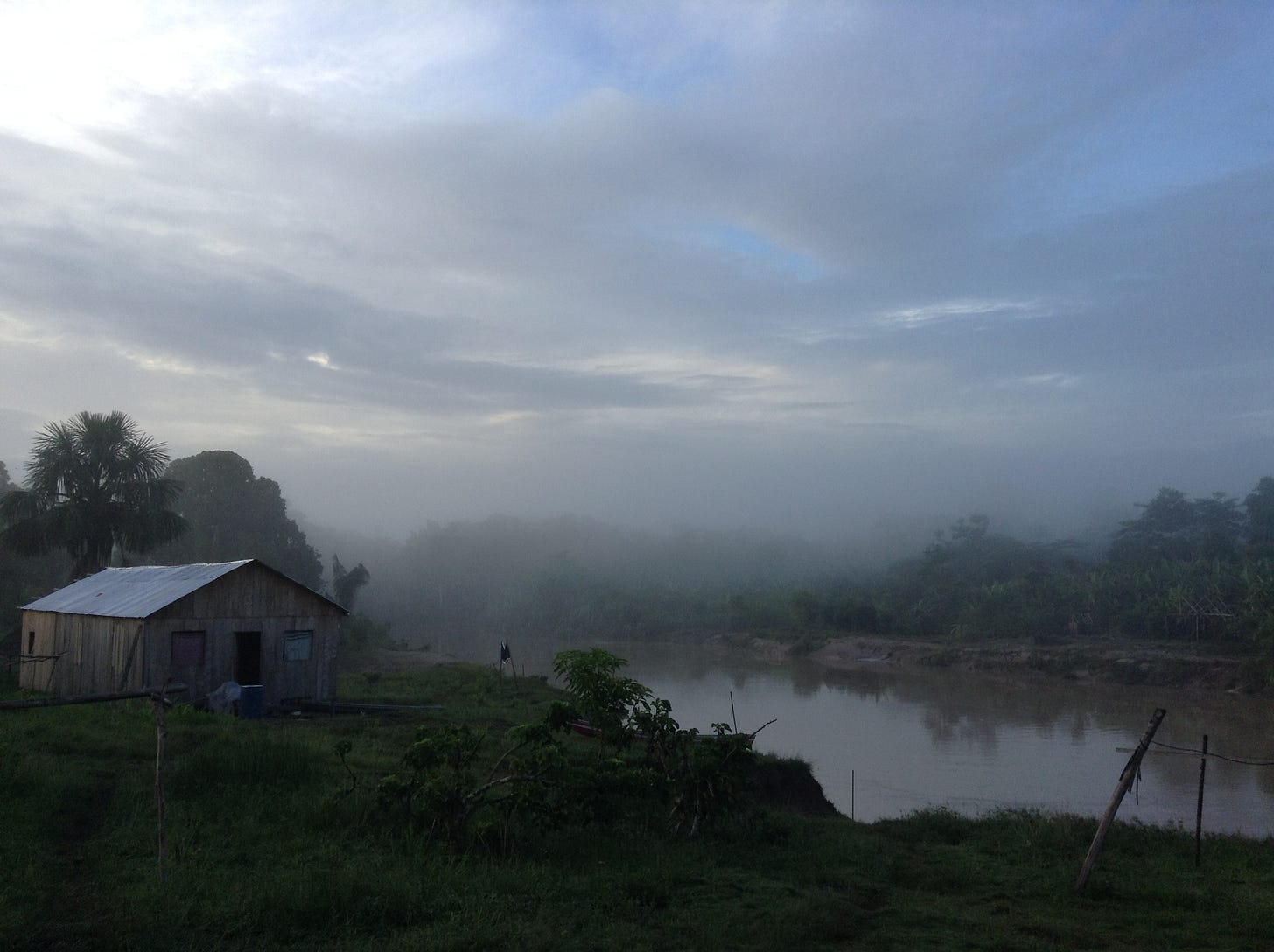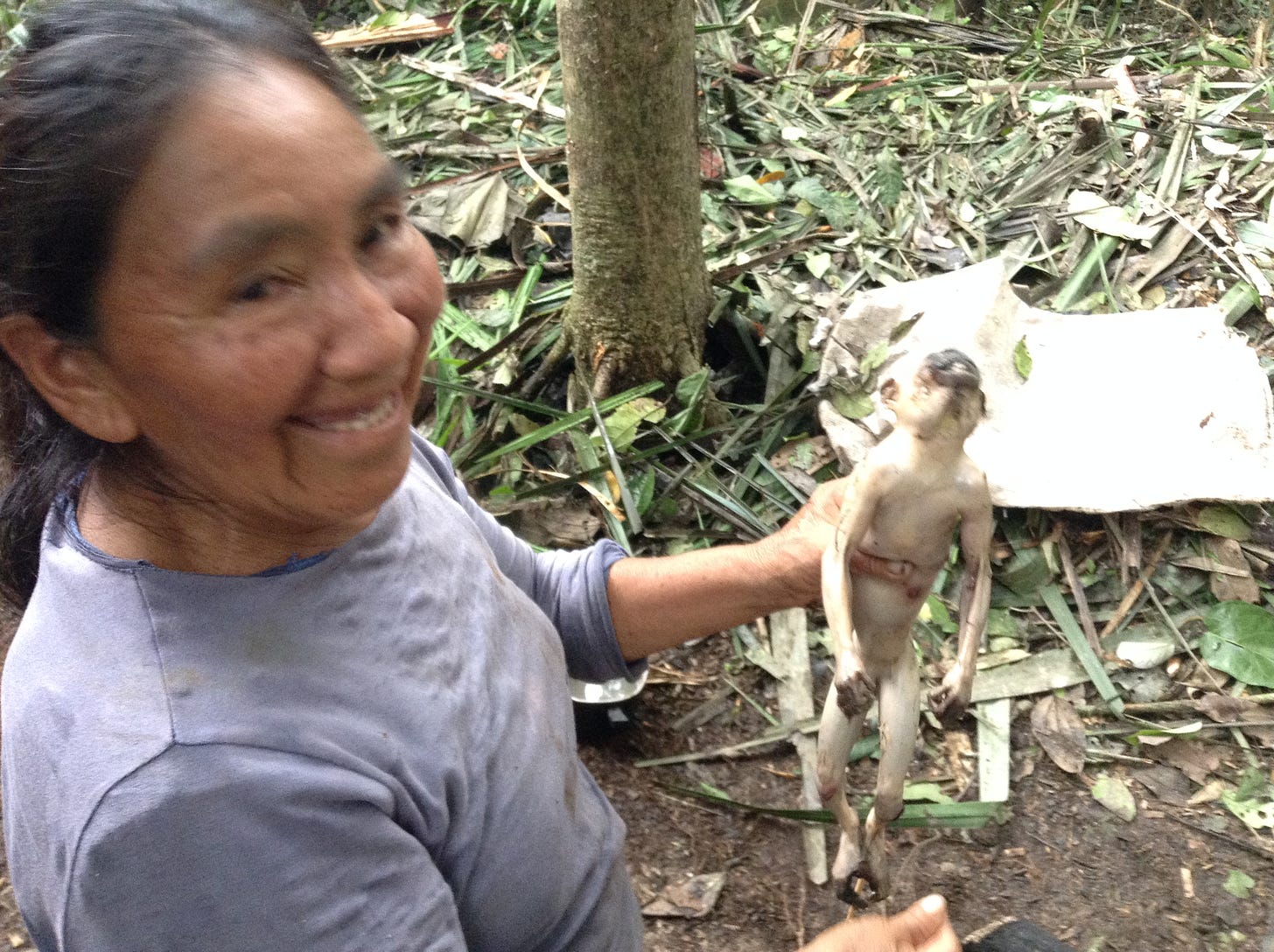Preparing for Muká
Chapter 7: I arrived back in Amsterdam with clarity, confidence, and trust. I decided that I would move to Peru the following summer, and to play in the orchestra until then. In the time in between...
I arrived back in Amsterdam with clarity, confidence, and trust. I decided that I would move to Peru the following summer, and to play in the orchestra until then. In the time in between I would concentrate on two things: spending time with the people I loved and preparing for the opening of the centre.
I stayed in a place of trust and committed to a daily practice of yoga and meditation. I built a website for the centre, designed the programs that would take place there, and looked for people who could come and work there. All while I continued to play in the orchestra.
In May 2013 I flew to the Sacred Valley to find a suitable location for the centre. Looking around in the area of Pisac, I found a beautiful, yellow house surrounded by stunning mountains. It looked very similar to the one I had seen in my Brazil visions the summer before. Seeing the house I had to laugh. I found the owner and made a rental contract for a year starting in August. Heading back home, I spent as much time with family and friends as I could. I knew I was going to be far away from them soon enough.
In July I left Amsterdam for good and moved to the Sacred Valley of Peru. After unpacking all of my things, I took a long bus ride to Rio Branco in Brazil. There I went to visit a Santo Daime community and picked up the medicine that I would use in the centre. Arriving in Rio Branco I could feel the last year's weight in my body. I felt a bit tired and weak, this time not from insecurity or fear, but from working so hard the previous months.
I realized I couldn’t open a centre for healing when I was exhausted. How could I be of service to people when I was not feeling well myself? I decided to take a break and travel a bit through Brazil before heading back to Peru. That was when I shocked myself by coming upon the road sign: CRUZEIRO DO SUL – 650 KM—the sign that started my incredible journey into the land of the Yawanawá. Meeting the tribe, and Luis in particular, provided the energy and guidance I needed for opening the healing centre in Peru. I returned to Peru after promising Luis I’d be back to the rainforest in three months for the dieta.
In Peru, I worked long days to get everything in place. A team of people gathered, and in six weeks all was ready. In the garden of the centre, I set up a tipi, which was going to be our temple. In full synchronicity, everything unfolded that I had foreseen. Soon I was leading one, sometimes two, ceremonies a week. Time flew by, and before I knew it, a year had passed.
The summer arrived, and I closed the centre for a couple of weeks. We had worked very hard that first year, and we all needed a break. I also learned that I was looking for a deepening of my study of healing, being on the lead of a healing centre. It hadn’t been the easiest year. I chose to attend a ten-day Vipassana Meditation retreat not far from the centre. In a Vipassana retreat, you meditate for ten hours in silence each day. During those days I had very deep periods of meditation. In one of them, I received a clear vision of the Yawanawá sitting in a circle. I was sitting among them, right next to Luis.
“Dennis, you are telling the story of our meeting so beautifully,” Luis said, “but this is not just a story to tell. This is a story to be lived. Whenever you are ready to start your study, you have to commit to it and make it happen. You have to come one day.” In the vision, he looked calmly into my eyes. Listening to those words again, I felt the call deeply. I had to make a choice between my commitment to the centre and my commitment to enter a three-month dieta. It was a difficult decision, as I knew that the centre would not do well with me being gone and out of communication for all that time. Yet I felt that I still had so much to learn, and the dieta would be important for my development and growth.
I felt that my ceremonies and healing work would deepen from the dieta, yet I felt opposing pulls between my commitment to the centre and my commitment to my personal growth. What would happen to the centre if I left? What would happen with the team and the people in the programs? Many questions arose in feeling that inner conflict.
That vision had happened on the eighth day of the meditation retreat. I held that vision and decided to make a decision on the last day, before going back to the center. During my last meditations, I came to see that I indeed had to go back to the rainforest. The medicine and my visions had always guided me on my path, and when I followed them, beautiful things unfolded. I had to trust this vision of going back to the Yawanawá as well, and the vision had not appeared just once—it had come several times. I couldn’t disregard a vision that kept coming back; it seemed too important. I felt a surrendering happen around my commitment toward the centre. If the centre was meant to continue, the dieta would strengthen it; if the centre was meant to transform into something else, the dieta would show the direction of that transformation. I had to go back to Brazil to be with Luis and the Yawanawá and to start the dieta of Muka. When that realization came, I bowed my head and took a deep breath. I could feel that a powerful time was coming, but I had no idea what was in store.
Coming out of the mediation retreat, I communicated my decision to my team and started to prepare for my departure. The team reacted with a mixture of excitement and insecurity, but my decision was firm. We had long meetings where we divided responsibilities, and in two months I was ready to leave and make my way to Brazil.
In October, I departed Peru, enjoying the stunning view as the bus wove its way through different landscapes and climate zones. As I rode, I felt the responsibilities of the last year and a half lifting off my shoulders. I built the healing centre with so much dedication, time, and energy. Now I was leaving it behind, not knowing what would happen to it while I was gone. It might be blooming and blossoming upon my return, or it might have crumbled. It had not been easy to leave behind. I decided I would have peace with whatever unfolded there. There was nothing anymore that I could do anyway; there would be no more emails, no phone calls, no decisions, no responsibilities. Slowly I started to feel freedom again. I slept most of the journey.
Once I arrived in Brazil, I sought out the Santo Daime in Rio Branco. I spent some days with them before I continued my journey on to the Yawanawá. In the weeks before, I had written Tashka, one of the Yawanawá leaders, to let him know that I planned to visit the village. I didn’t receive any response, and after about ten messages, I gave up. I felt some insecurity about this. I had left the centre, freed up my time, and travelled all the way for something I wasn’t even sure was happening. I prayed I hadn’t made the wrong decision to come here. Would Luis still feel our connection? Would he know I was coming? Would he remember me? Would he even still be alive?
I took a car and arrived late at night at the same small harbour village where I had been dropped off fifteen months earlier. This was the place where I had frantically waved my arms at that bunch of strangers of a boat, a boat that magically took me to the Yawanawá territory and Luis. On this second journey to the tribe, I slept in a hammock at the gas station, right on the water. I asked the gas station owner if he knew if Luis was coming. He answered that Luis would be there early in the morning.
When morning came, I sat a long time waiting for Luis, but he didn’t come. I started to grow annoyed, and my doubting mind started to kick in. What was I doing here? Did I really expect all of this to happen just because I had a vision of it happening? What the hell was I doing here in the jungle, leaving my responsibilities in Peru behind? All those thoughts made me ridiculously impatient. I had forgotten how things work on “jungle time”: unexpected things come up, and travel takes a long time.
After a few hours of waiting, I couldn’t sit any longer and went out to find the owner of the gas station again. I asked him where Luis was and when he would be arriving. He looked at me with surprise. “Didn’t you tell me that Luis was coming in the early morning when I asked you yesterday?” I asked in my almost non-existent Portuguese.
When he understood my question, he started to laugh. “I didn’t say that Luis was coming in the early morning,” he managed to say between laughs. “I said that ‘luz’ would be arriving in the early morning.” It took me a while to grasp what he was saying. Then it sunk in. He had said that “light” would be arriving in the morning, with the rising of the sun. He hadn’t even been talking about Luis. In fact, he had no idea who Luis was. I joined in his laughter when I understood what had happened.
I decided to take action and not let my insecurities around the situation get the upper hand. In less than an hour, I was on a private boat, travelling up the river toward Sete Estrellas. The journey, which last time had felt peaceful, felt far too long this time. I was anxious to see my spiritual family. How would they be? Would they be expecting me? Would they even be there? Many questions raced through my mind, and it was difficult to truly appreciate the stunning nature around me. Still, after a few hours, the ride soothed me a bit. And when I started to pay more attention to the surroundings, I could see how beautiful it was to be back on the water again, surrounded by all the trees and plants. The sun was shining; the sky was blue. Here I was again, back in the Amazon. The boat was moving slowly over the water, the noisy engine buzzing along. The river was between three and six meters wide, depending on where we were. Like the body of a huge snake, it curved, curling its way into the forest. The water was brown and shallow. If you stood, your knees would still be above the water level most of the time.
After a six-hour ride, we finally arrived. I jumped out of the boat, full of excitement, onto the shore, and ran to Luis’s house. One of his sons saw me and ran toward me, shouting, “Denni!”
I gave him a big hug and immediately asked where Luis was. My heart was pounding. I felt so many things at that moment, a mix of impatience, excitement, insecurity, and more. Indians gathered around me, and everyone was talking to each other. It was difficult to understand what they were saying, but in a few minutes, I learned that Luis was not there. Had I made this long journey in vain?
Luckily some men got my suitcase and guitar from the boat and guided me to Luis’s house. Louisa came and gave me a big hug, took my hand, and planted me on the only chair in the village. She walked to the stove and poured me a cup of coffee with lots of sugar. It felt so great to see her again. She took my face in her hands and looked at me with her big, toothless smile.
My mind was going in every direction. Many people were speaking at once, and I was trying to piece the story together. My Portuguese was still very limited at that time. Not knowing what to do next, and not wanting to keep sitting there on that chair, I decided to open my suitcase and hand out some gifts I had brought for the tribe—kitchen utensils, watches, and Peruvian bracelets and necklaces. It was a good way to distract myself from my concern and disappointment at not seeing Luis.
When I was almost finished giving out the gifts, people started to shout. There he was! My heart skipped a beat. Luis was walking up from the river. I ran outside and gave him a big hug. A wave of gratitude poured over me. I had no words to speak. I took off my necklace with a precious crystal that I had been wearing for years and hung it over his neck.
We went inside and sat across from each other in his kitchen, the whole village surrounding us. We looked at each other for a couple of minutes, and nobody spoke a word. “I have been waiting for you since our last meeting,” he finally said. “I started to wonder if you would come back.” He looked at me with his sparkling eyes. “God kept telling me you would be back, so I just waited, and here you are.”
“I am so grateful to be here, Luis,” I answered. “It has taken quite some time for me to get back here, so I am sorry for the delay. I very much look forward to this time, and feel so grateful for our connection, for our meeting, for this land, and for the opportunity to learn.”
He explained that Tashka, the man I had emailed countless times, had told him I was arriving on the 8th. He had gone down to the small harbour village and waited for me at the harbour on the 8th and the 9th. “You didn’t arrive there, so I came back, to wait for you here.” It did me so much good to hear those words. I took a deep breath and felt my body relax into the situation. I had indeed written that I would arrive in the harbour on the 8th, but the last days in the centre had been hectic, resulting in me leaving two days later than planned. As I hadn’t received any response from Tashka to my previous emails, I hadn’t sent him another one explaining that I would be arriving late. It felt good to hear that Luis had been waiting for me.
“In the next few days we will go into the jungle and do the dieta with Muka,” Luis said. “We will be in a very special and sacred place. That is where you take the Muka.” Hearing those words I relaxed even more. The last months had been quite difficult and tense. I had made a decision to leave the centre and to come to the jungle, not knowing if Luis would be there and if it would be possible for me to start the dieta. And here I was, it was all unfolding. I closed my eyes for a moment to let that fact sink in.
There was absolute silence in the room. “Wow,” I answered. “I am so happy to hear this. When can we go and see the place?”
He looked at me with a mysterious smile. “We can’t go there yet,” he said. “The place doesn’t exist.”
I was confused. There was a huge language barrier between us, so I was not sure if I understood what he had said. Immediately my feelings of insecurity returned. What was happening? “So what does that mean?” I said. “Are we going to do the dieta or are we not going to do the dieta?”
Luis started to laugh. “Don’t worry. The dieta is going to happen.” Finally, he said, “We are going to clear a pristine piece of jungle, and there, in the middle of the jungle, where no houses have yet been built, we will build a house for you in the ancient tradition. And that will be the place for you to take the root of Muka. You, I and Louisa will stay for three months in total isolation.”
The last few hours had been a rollercoaster of emotions. It had been such an act of faith to come back to the jungle and to fully trust the messages I had received in my visions. To now sit in the middle of the jungle, on the only chair in the village, with a bunch of Indians standing around me, hearing that it would all happen in ways I couldn’t have even imagined, was profound. It was more than I could have ever wished for. I shook my head, stood up, and hugged Luis.
A cry went up from some of the men in the room:
JIIIIIIIIHUUUUUUUU!
I learned that this was a shout Yawanawá love to make when they are excited about something.
We ate dinner together, sitting on the floor of the living room. The energy felt alive and vibrant. After a while I took out my guitar and started to sing. The whole village was cramped inside that little house. I was so happy. The room was full of joy.
Later, I took out my shruti, a small harmonium from India. None of the Yawanawá had ever seen one before. I started to play, and the deep and sacred sounds of India poured into the room. I sang the song that had come to me in the last weeks, my song for Muka:
Muka, Muka
Padre de la tierra
Enseñar me, curar me
Trabajo con me, entra me
The song poured out of me, purely and beautifully. Luis watched and nodded. That first night felt so good, it was so special to be back with all those beautiful people. The jungle was singing, the stars were shining.
The next morning, we woke up, bathed in the river, and prepared to go into the jungle with Luis’s son. We had a breakfast full of laughter, full of love. I was feeling so grateful to be back in the presence of my jungle family. I trusted that whatever was in store would be beautiful and perfect.
We headed out into the forest. The path was almost non-existent. We cleared the path with machetes and made our way into a deeper part of the jungle. It felt like a special place, sacred and profound. After an hour of hard work, we arrived at the spot that Luis had talked about the night before. He showed me the exact location where he would build the house for me. I looked around and felt confused. The forest looked so dense, full of plants and trees. Where would we build a house? I had a hard time imagining it happening. My doubting mind came in again: how long would this take?
I decided to stay silent this time and to trust the whole unfolding. A few minutes later, some more men showed up, and together we began to clear the jungle. In just a few hours, we had cleared a big area; it happened at a speed I had not expected. It was amazing to see how much those Indians could do with a few machetes and a whole bunch of muscles—I guessed these guys had done this before. We worked until sunset and then went slowly back to the house of Luis.

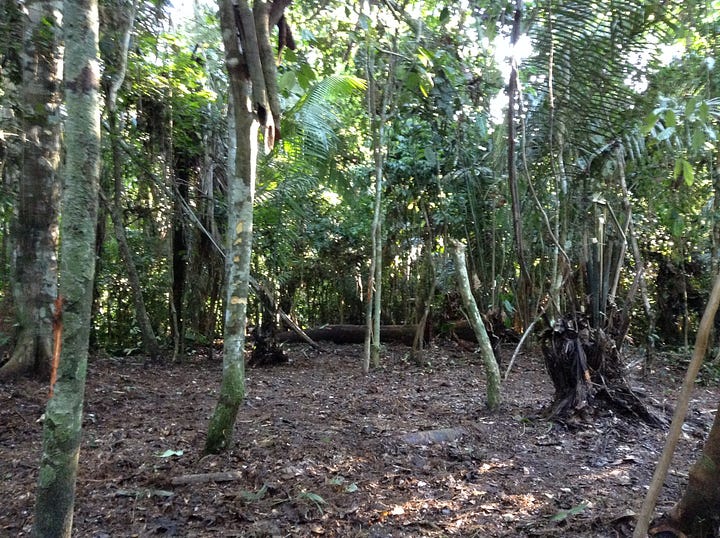
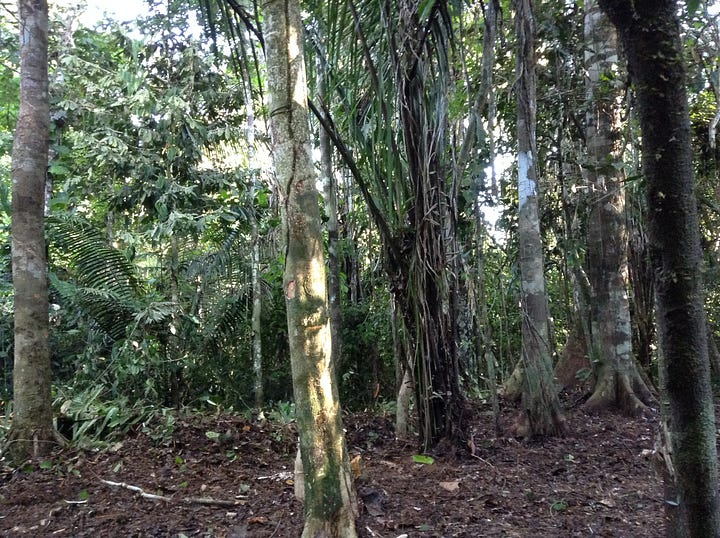

In the evening, we all had dinner together. The Indians ate mostly in silence. I asked some questions during the meal, but the responses were very short. Finally one of the children told me: “First we eat, then we speak, okay?” Hearing that, I had to laugh and nodded my head. I guess I was going to learn quite a few things from the children here.
After dinner, Luis took me to his porch overlooking the river and sat down next to me. The stars were shining, and many animals were singing. We sat there for a while in silence. After a while Luis shared more details of the dieta. Muka required no salt, no sugar, and no women, he said. We both laughed at that part. I could eat only simple foods: cooked green bananas and corn. Later in the dieta, rice, dried bread, and beans could be added, but not much else. Sometimes I would be allowed to eat a certain type of little fish. I couldn't drink pure water for three months—instead, only a special drink called caiçuma, which is made of the yucca root, fermented by the mouth of a woman. Later in the dieta, I could also drink lemon water or some sort of tea. I would take the root of Muka, which looks like a small potato, only once. That would be the beginning of my dieta. During the dieta, we would stay in the jungle, away from the village. We would find the Muka in the jungle on the first day of my dieta—fresh is best.
I was to drink Ayahuasca at least every fourth day. Luis told me I had to prepare the medicine myself. With a big smile, I went inside, opened my suitcase and placed a bottle of Santo Daime medicine next to us on the porch. He took the bottle, looked at it, opened it, and smelled the medicine. He nodded, put his right thumb up, and said, “Muito bom!” I started laughing. “You are a quick student,” he said and then joined in the laughter. There was so much joy and connection between us. It all felt so good, all that was unfolding.
He said we would use rapé to supplement the Muka. Rapé is a kind of powder, made from the tobacco plant, that you blow up your nose. I remembered the first time I had taken rapé on Luis’s porch during my first visit. It had been a very strong experience. I didn’t feel a great connection to this medicine yet, but I had committed to this dieta, to Luis, and to Muka, so I would accept every aspect of the process. We would prepare the rapé over the following days.
The dieta would require quite some preparation: making the rapé, building the house, and getting all the supplies. It would take a little while before my dieta could start. And because there are no shops in the jungle, we had to go to the city of Tarauacá to buy all our food and supplies for the next three months—hammocks, candles, mattresses, tools, machetes, plates, cutlery, rice, beans, corn, and many other things. It would be a three-day journey to Tarauacá and back.
Luis also explained an important aspect of his role in the village. Many people counted on him for food and support. People dropped in all the time asking for things, and he and his wife Louisa were generous and kind, always sharing. Louisa reminded me so much of my grandmother, who knew that giving is the true receiving.
Luis explained that he was building this house for me from his heart, because he believed in me and loved me, and because he believed our stories were coming together into something sacred. He was hoping to build four houses in total in the future, plus a temple space so he could receive more people. He asked if I could help.
He asked whether I could pay the men building the house and also to pay him for opening and leading the dieta. That comment resulted in a long conversation around money. I had come in with a good stack of money in my pocket, so I was prepared for all that was to come. It was interesting to learn that money had not been really part of the village yet. In that conversation, we agreed on a wage for him, for the men who would build the house, and for the women who would cook for us and wash our clothes during the three-month dieta. For the amount of money we agreed on, and an aluminium boat for Luis thrown into the bargain, all else would be included in the dieta. Luis would be fully available and organize all the things that were needed for the dieta to happen in the right way.
The agreement we made felt good. There was not a lot of money in this small community, and they sometimes visited Tarauacá to buy soap, salt, clothes, and other necessities. This was one of the first times that money from outside the village was coming in, and everyone felt happy about that.
We also talked more about the house and the place in the jungle that we were going to build. The plan was to continue to open that spot in the jungle and then to build a traditional house there for my dieta. Only Luis, Louisa, and I would be permitted in that space since a dieta is so sacred. No other people would be allowed to enter. He would communicate all that to the village to assure all would go well. All would be set up so that the dieta would be really sacred, held in the traditional way.
It felt as if we were entering a sacred alliance together. They were creating a sacred experience for me, a place to go deep, to learn, and to receive their most sacred plant Muka. This time was an opportunity for the community to share their vast knowledge—knowledge of the plants and the wisdom of the jungle. My job was to help create a space for that to happen and to make sure that all people involved would be honoured on the way. That evening, I went back to my hammock in Luis’s living room with a lot of gratitude. I felt so blessed.
Early next morning we went back into the jungle to continue our work. When I offered my help sharpening a machete, I immediately cut my finger. Everyone laughed, and someone took the machete from my hand and politely told me to sit down. They were more experienced and could work very fast together. There I was, excited to be in the jungle and wanting to help out, sitting on a fallen tree and watching everyone working hard to build my house. It seemed like patience and surrender was one of the first lessons of the jungle. One day trees were cut; the next day the structure was erected. The house was around five meters high, eight meters long, and four meters wide. We covered the roof with palm leaves. They made the floor from the bark of a tree and created a veranda where we would hang out and play the guitar. These men were masters of the forest: with just machetes, they created a beautiful, complete house in just a few days.
